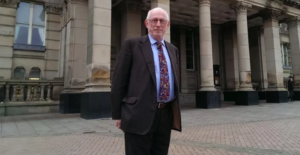Wiltshire Council is in a strong financial position because of an approach to running the authority that combines preventative investment with taking a continual long-term view – and there could be lessons for others in local government to learn. Jason Holland spoke to council leader Richard Clewer.

A focus on prevention and a long-term approach. These two factors have allowed Wiltshire Council to balance its budget for the next two years without the need to rely or draw on reserves. But they also have the power to transform the local government finance sector “within two or three years” if they were to form the backbone of all councils’ financial strategies, believes Richard Clewer, leader of Wiltshire Council.
Speaking to Room151, Clewer highlights how a “fair chunk” of his ethos derives from his passion for strategic war gaming – a passion that is matched by his enthusiasm for overseeing the running of the council and ensuring it is in as strong a position as possible to continue for many years to come.
“When you’re playing complex war games, you’ve really got to think ahead, because an action you take now will have an impact 100 years on in game time,” he explains. “And one of the things that you will always get then is cumulative benefit. Gamers will call it stacking. It’s getting one thing that when you apply it with another makes everything better, and it makes it better by more than just the sum of the two parts. It’s multiplicative, rather than additive.”
Empowering officers to start thinking like that has yielded impressive results – especially when councillors “can provide the strategic direction without meddling”. He adds: “The officers love it – they’re being given permission to deliver on what they want to deliver as opposed to just making the cuts, to make things better. And it’s amazing how motivating that is for people.”
So how does strategic gaming translate to balancing a local authority budget? As noted, there are two key foundations for a successful model.
“The approach we as Wiltshire Council now take is very much looking at the long term – or at least the medium term, as I think it’s hard to look at the long term with the uncertainty in finance.
“It’s something I learned from taking charge of Wiltshire Council housing around 10 years ago and looking at the Housing Revenue Account, understanding that it’s going to be there for many years to come. Therefore, you’ve got to plan in that long term and the moment you do, finance becomes a heck of a lot easier because you’re not chasing short term gimmicks. You’re looking at strategic plans that actually deliver proper savings.”
That approach has been applied to the way the council sets its budgets. “This year’s budget wasn’t actually about this year’s budget,” Clewer explains. “The separate budget setting process we’ve just been through is actually focused on the budget running the following year and the year after that.”
The council has been looking at the savings it would need to make not this year, as they are already dealt with, but rather “at whatever adjustments need to be made the following year and the year after that to deal with the pressures that we’re expecting to see coming”. Councils are here for the long term, he notes, and “we need to think in the long term”.
Full future focus
Prevention goes hand in hand with that approach – but it must be actioned consistently. “Prevention is something that we talk about a huge amount as a sector and do very little of in my experience,” Clewer says. “I am really keen on prevention because it makes people’s lives better and it saves money when it’s done properly.”

It comes down to spending money in a way “that’s going to actually start solving problems, rather than just putting a sticking plaster on the problem”, he says. Or to put it another way, “the constant application of wherever we look at an issue, we are not thinking about next year’s budget, we’re thinking about what the impact will be in several years’ time. And we’re then thinking about what we can do to drive prevention through it.”
Clewer offers a few examples to prove the point. One is decarbonisation. An 80% reduction in the council’s emissions since 2016 has led to current savings. “We’re saving £2m a year and repaying the debt that we’ve incurred to do the work that’s generated the same,” he says. That may be just £2m on a budget of £400m, but it “builds up”, as Clewer puts it.
In children’s services, he points to work the council is doing to potentially intervene early in situations where a child might end up coming into care. “In many cases, by intervening early and helping people get their lives on track, you can then keep people out of care which reduces that cost implication,” he says. The council’s looked after children numbers actually fell slightly this year, whereas at most councils “they’re going through the roof”.
There is also significant preventative work in children’s services, including Pause, which is a national programme that works to improve the lives of women who have had more than one child removed from their care. Practitioners provide intensive support over 18 months to prevent the cycle continuing. Clewer says that whereas it costs about £300,000 a year to run this particular programme, it saves about £700,000 in total – a net saving of £400,000.
In adult social care, Clewer says Wiltshire Council is seeing a reduction of adults who are going into care homes and an increase in domiciliary care. While having the benefit of being significantly cheaper, it is “also better for those people who are being looked after in their own home and in their own community – not in every case, but in most”.
Clewer also points to a current proposal in housing where five homes would be purchased at a total cost of about £1.6m specifically for the purpose of providing support for children with particularly complex issues. “That by itself saves just over £900,000 a year,” he says. “In fact, we’re only spending £400,000, the rest is borrowing. It’s also being repaid and we have a house at the end of it as an asset.”
This “continuous focus” on the future reflects the “different culture” that Clewer thinks Wiltshire has compared to many councils. “Technically we’re member led, but I really value challenge and debate. If I get something wrong, I expect my officers to turn around and say ‘look, this is nonsense’ in that conversational human approach. That really helps as well because there’s a lot of challenge backwards and forwards. And that leads to better financial decision making. I don’t want anything hidden. I want it all open. I want us to understand as a whole council, and therefore the public, what we’re doing, why we’re doing it, and what savings we’re making.”
The greater the transparency there is, the easier it is for the professional officers to do their job, keep control of costs, and shape the future, he believes.
Strategic games, not political games
Perhaps the most interesting thing about Wiltshire’s approach is that any council could do the same – even those already in financial difficulty. And, as highlighted, Clewer believes that if they all did, the results would be transformative for the sector within two or three years.
“I think councils and government as a whole should take it on and it frustrates me that we are stuck on electoral cycles, but it’s the political landscape we’re in,” he says. And although Wiltshire is not immune to doing things for party political reasons or “because we know the electorate want them”, he always makes sure there is a “preventative spin”.

The time it would take to implement Wiltshire’s approach could also be a barrier at other councils, although Clewer stresses that results can be seen quicker than some might expect.
“Our approach probably started eight years ago in children’s services, and the early seeds of the approach in housing began at around the same time. It’s very much accelerated since,” he says. “But with Covid not being a great time to be embedding that approach, it’s probably in the run up to the last election we managed to start it, and I have been leader for about two and a half years.”
The current budget will therefore be the fourth budget where the approach is really being embedded, but Clewer says because prevention takes time to kick in, it has “only really hit its stride properly in the last 18 months”.
To be successful, political leanings might also have to be put aside, wider relationships formed, and goals set. “You do need to reach out, but that isn’t always easy. At Wiltshire, we’ve got a very open scrutiny process, including a financial planning task group that gets pretty much the same data I would get – there’s nothing hidden from them,” Clewer says. “I’m very keen on involving all members through the screening process and where we are developing a new policy, especially the critical ones. You try and have a functioning relationship with everyone, because that way there’s that greater understanding about the benefits of the approach we take.”
Another important relationship, of course, is that between local and central government. Currently, that relationship is “difficult”, he thinks, and not helped by “the countless examples of councils who, sadly, give government reason not to trust us”.
The sector should not rely on government to solve its problems, he says, and this forms another vital part of the Wiltshire ethos. “I absolutely do not believe that it’s sensible to wait for government to fix your problems. We’ve got to go and solve them ourselves,” he says. “Whatever state we’re in, we’ve got to take ownership of that position. Because by doing that, you start figuring out what the solutions are.”
Calls for councils to be given automatic 10% council tax increases when they haven’t declared a s114 is a “bit strange”, he says, while the use of reserves and requests for capitalisation directives are only going to “make the problem worse in the future”.
“I think you’ve got a sector that’s struggling and almost got into a mindset of ‘well, someone’s got to help us, therefore, who cares?’. That’s probably slightly unfair, but it’s almost the way I’d read some of the bunch of papers that I’m seeing now. You’ve got a government that doesn’t really trust us and that doesn’t help that position. I think we have to be professional about it. And perhaps the political nature of councils makes that professionalism, not from officers but from the political side, hard because it also means being a little less party political.”
As can be seen from the current budget and medium term financial plan, Clewer’s and Wiltshire’s approach to finance is working. Indeed, the Local Government Association has asked the authority to demonstrate some of its evidence to others to see if the approach can be used at other councils.
Until now, Wiltshire Council has not felt the need to shout about the work it is doing. But with the current state of local government finance, it is more important than ever to find success stories.
Clewer says both at his authority and in the wider sector there is much more that can be done to take the preventative investment and continual long-term approach further. Wiltshire has already gone beyond words to take decisive action, and if other councils were to do the same the results could be very interesting.
—————
FREE bi-weekly newsletters
Subscribe to Room151 Newsletters
Follow us on LinkedIn
Follow us here
Monthly Online Treasury Briefing
Sign up here with a .gov.uk email address
Room151 Webinars
Visit the Room151 channel












